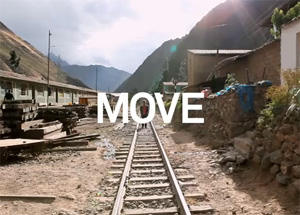Summer
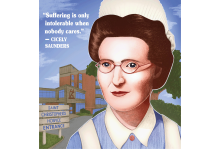
In Derek Walcott’s poem “Midsummer, Tobago” he recalls a “summer-sleeping house / drowsing through August.” At Sojourners we are savoring family vacations, relaxing, welcoming new babies — and telling stories about our history and our becoming.
Sojourners assistant editor Josina Guess interviewed actor Aunjanue Ellis-Taylor about her recent films Origin and Exhibiting Forgiveness. Their deep conversation releases transformative power, an example of what narrative theologian James McClendon Jr. called “biography as theology.” What happens when we wrestle for truth in our personal and social histories, and open that struggle to God? As “Living the Word” writer Raj Nadella warns, “distorted memories of the past may misdirect our future; they may cause us to miss the way God is leading.”

SUMMER IS ALMOST HERE, and churches ... slow ... down. Folks are planning for vacation. Staff are away. Pastors are away. It’s as if we take our status as middle-class bourgeoisie more seriously than our baptismal vows.
By contrast, in the summer the biblical texts pick up—in intensity, directness, drive. Pentecost falls on us like an avalanche of fire, teaching us languages we don’t know, names, places, people. The old joke is that war is God’s way of teaching geography to Americans. No, in the church, that would be Pentecost. The descent of the Holy Spirit empowers people to preach who most say shouldn’t (in our texts that includes Arabic-speakers, women, unnamed prophets), and confounds those of us who think we “should.” Then Trinity Sunday, and all three persons of the triune Godhead are on the stage. We now know God as fully as God can be known by mere creatures. What we can’t know is not because God is tragically removed or far away. No—it’s precisely because God has come so unbearably close and is so unimaginably beautiful. That’s why we can’t take all of God in. So we praise instead of merely examine. And then Jesus sends out the disciples in mission to do what he does, or even greater things. Teach. Heal. Exorcise. Baptize. This doesn’t sound like a summer vacation or even a mission trip. It sounds like a new way of being in community for others.
That’s what the church is, in summer or anytime.

Summer’s gone, and with it the breezier reading of the beach and the hammock. In its place comes a more serious reading list — more literary, less lightweight. Here are seven books where religion plays a role — though not a proselytizing or a self-help one — to read between the falling leaves.
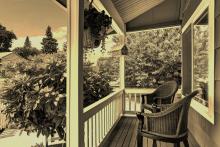
IF THE SWELTERING heat were not enough to dampen the midsummer soul, D.C.’s metro system has shut down portions of its train lines for long-overdue repairs, leaving us retreating to our homes—and, if we’re lucky, our porches: the outdoor living rooms of a city.
Summer is a time when lethargy reigns, especially here in the humid semi-South. Unlike in the North, where frigid winter inculcates an obstinate determination to prove that weather won’t hold us back, the South is a respecter of heat. Come August, everything s l o w s d o w n.
There’s no better time for porches than in a humid heat, when sleepy hospitality reigns supreme. Summer is the season for public myth-shaping, when private dreams and tweeted ideologies collide on the street with other humans and the full cacophony of life lived outside. Our systemic ills are most visible in the summer: residents suffering from water shutoffs, police brutality committed and pardoned, an education system that affords some children elite summer camps and denies others a glimpse of the outdoors, the merry-go-round of ads reminding us that “summer” is skin-deep and buyable. So is our hospitality most visible—music drifting from one door to the next, neighbors sharing an extra lemonade.
In earlier decades, houses were designed for life to happen just off the street. So the living rooms of most houses in D.C. are in the front—kitchens, studies, and bathrooms in the back or on another floor altogether. The dream of safe ensconcement away from the unpredictable intrusions of neighbors or vendors is unique to suburbia—in urban design, proximity is power. Front porches, just slightly removed from the chaotic spontaneity of summer streets, are both cachet and a basic necessity—permeable culture containers waiting to capture the overflow.
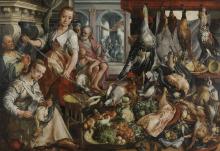
THE “DOG DAYS” OF SUMMER refers to more than the weather. Attendance in churches is often down due to travel. The energy level is low, with students away and families scarce. The church year tends to gear up with the academic one, to peak with Christmas, to peak again with Easter, and then to peter out into the summer. How do we stay invigorated? How do we energize our faith with the zeal of the psalmist: “Come and see what God has done: God is awesome in deeds among mortals” (Psalm 66:5)?
I challenge churches to do something different with the summer—turn the dog days into an excuse to take risks. “Something different” will differ with context. Try a dialogue sermon. Answer live tweets from the youth. Preach a sermon entirely in the interrogative mood—nothing but questions or one that, like the psalms, is addressed solely to God. Invite testimonies about faith and service. Invite mentors who inspired you into ministry to offer their story during worship or Bible study. With the elections coming, talk about how the church has engaged with politics through history—and don’t leave out the bad stuff. Immerse yourself and your community more deeply in the gospel for the renewal of your life together, always an aspect of church and worship.
Summer is often a season of travel and meeting strangers. Remember that Abraham and Sarah offered extravagant kindness when they met three strangers in the desert. How can we become known, like Abraham, as “the friend of strangers”?
[July 3]
A Livable Faith
Isaiah 66:10-14; Psalm 66:1-9; Galatians 6: 1-16; Luke 10:1- 11, 16-20
ST. AUGUSTINE describes breast milk as a sign of the goodness of God. Who would dare say he’s wrong? It’s so there—abundant, nurturing, creating intimacy. It’s like God with all of us. But Augustine isn’t being original here. Isaiah is. God is a nursing mother, Israel is a nursing child, and both are happy with one another.
Eugene Peterson has made a career of insisting on the “livability” of scripture. We can do this stuff—with a healthy dose of the Spirit’s power. Coastal Church, a Pentecostal congregation in downtown Vancouver, made Luke 10 a sort of constitution for its life together. Rather than preach or protest at people, it has made a point of visiting people’s homes (already difficult in an age that loves privacy). They offer blessing. They ask what hurts and pray for it. They eat together. And they speak of the reign of God. The church has grown, lonely neighbors find surprising friends, and the reign is manifest.
THE NEWS IN mid-May was grim: Scientists announced that melt across the West Antarctic was proceeding much faster than before. In fact, they said that at this point the melt of the six great glaciers fronting Amundsen Bay was “unstoppable,” and that over a number of decades it would raise sea levels by 10 feet or more.
This is another way of saying: Given dominion over the earth, we’ve failed. We’ve taken one after another of the planet’s great physical features and wrecked them. The Arctic? Summer sea ice is reduced by 80 percent, and it’s an every-year affair now to boat through the Northwest Passage, impassably choked by ice until this millennium began. The seven seas? Thirty percent more acidic than they were in the past—and the acidity could double or triple by the end of the century. The Antarctic? It’s not just warming rapidly, but its wind patterns have been changed by the ozone hole in ways that amplify the heating. Storms are stormier, droughts are deeper, fires last longer, rain falls harder.
And all because it was a little easier and a little cheaper not to change off fossil fuels. When scientists sounded the alarm about all this in the late 1980s, the atmospheric concentration of carbon dioxide was about 350 parts per million—or what we now consider the upper bound of safety. If we’d heeded their fervent warnings, we’d have moved with great speed to convert to solar and wind power. We’d have parked our SUVs. We’d have insulated every home in the world. It would have cost money and it would have been inconvenient; on the other hand, it could have bred solidarity in much the same way that preparing for World War II transformed the U.S.
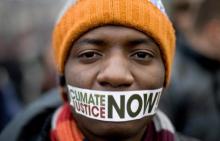
STATISTICALLY, the last couple of weeks of July are the hottest months of the year. In recent decades, the fossil fuel industry has been making them steadily hotter by burning huge amounts of coal, gas, and oil: Last year was by the far the warmest year in American history, and it came complete with biblical-scale fire, drought, and storm.
But this summer it’s the environmental movement that’s going to turn up the heat. Summer Heat is what folks are calling it: a collection of actions taking on the fossil fuel industry in every corner of the country.
Some of the action will stay focused on the route of the Keystone pipeline, but the emerging fossil fuel resistance is much broader than a single project: We’ll be at refineries and power plants and proposed coal ports, and we’ll be making clear that climate change is just part of the spectrum of damage that includes everything from air pollution to political corruption.
These battles have been led on the local level for years now by climate justice groups, by farmers and ranchers, by indigenous activists—by the folks on the frontlines of the damage from fossil fuels. But they deserve backup and reinforcement from the rest of us. And, of course, in an age of global warming, all of us are potentially on the front lines: Until Hurricane Sandy broke over their heads, most people in lower Manhattan thought the world was treating them pretty well.

It’s a hot summer evening in a Midwestern town. The grass is glimmering in the bright lights, contrasting with the brown dirt of the base cut-outs and pitcher’s mound. On the field, nine to a side, young men are dreaming of making The Show, although one suspects that in their hearts they know most of them won’t. There are no big city teams flush with cash, no mega-millionaire superstars.
The park is half-filled with fans, many of them families out for an evening together. It’s a diverse slice of America; white, African American, Latino, a few Asian. Young boys, and a few girls, sitting in the stands with their gloves on, awaiting a hoped-for foul ball souvenir. Dinner is bratwurst or a chili cheese dog, followed by peanuts or popcorn.
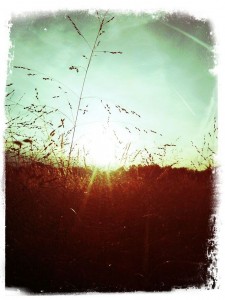
Autumn mornings -- when the cool rain is hitting the tin roof and the breezes blow with enough swagger to make the trees bow in admiration -- remind me of when my second daughter was born and after we had held her in our arms for some time we knew exactly what her name would be. Jorah (meaning "autumn rain" in Hebrew.)
I cannot help but reminisce about those summer sunsets (pictured above) when the sweaty warmth stretched late into the day. Those days were full of bold, luminous life. A bountiful garden. Happy hens sauntering. Silly children splashing and running and laughing.
During the summer season, my wife's delicate hands turned, with soil under her nails and calluses here and there from hours of loving toil in the garden -- always walking towards me with a bowl full of color and a mouth cracked open by a proud grin. She mothers the vegetables in her with almost as much attentiveness and love as her own babes.
Now autumn's crisp air awakens us as we feel the seasons shifting. The trees cast all their energy into turning shades of green into glorious reds, yellows, oranges and golds, a celebratory finale before bowing out for a season of slumber.
This Friday, October 7, 2011, marks 10 years since the United States invaded Afghanistan in the name of the "War on Terror." Sadly, this summer President Obama announced he'll continue our military presence in the country until 2014, and Congress has agreed to follow his lead.
Where do we go from here?
R.E.M. has ceased to be. The band announced its break up late Wednesday. And fortysomethings worldwide mourn the official end of our collective youth.
Rise of the Planet of the Apes is a surprising addition to the typical summer blockbuster canon -- for one thing, it manages to entertain and challenge, without resorting to gratuitous violence to make its point. But there's a deeper subtext that is even more unexpected -- for this is a story in which we start to lose.
It was fashionable in the late 1960s and early '70s for science fiction films to attempt to out-dystopia each other -- see for example the notion in Soylent Green that post-industrial humanity snacks on itself to survive, the suggestion that only robots can be trusted to look after creation in Silent Running, and the climactic revelation in the original Planet of the Apes that a few generations from now, the nuclear arms race will end in mutually assured destruction. All these point to a simple philosophical idea: that humans cannot be trusted to care for ourselves or the planet we steward.
It's been a fabulous few weeks for movies -- at theaters and at home. There are images in the great Russian director Andrei Tarkovsky's Solaris, recently released on Blu-ray and DVD, that are so beautiful they can evoke an aching longing for transcendent experience. This is entirely the point, for the film is about the search for meaning in a God-breathed universe. A man goes to space to investigate a mystery, discovers himself in the face of his loved ones, and ends in an embrace with the divine -- love itself. It's an astonishing work of art that repays multiple viewings, and serves as nothing less than an icon for worship. This summer's The Tree of Life, the fifth film in 40 years from the Christian humanist artist Terrence Malick, becomes something similar, and in the process makes excellent cinematic use of Brad Pitt and Sean Penn as avatars of contemporary masculinity. It's the most moving film I've seen this year.
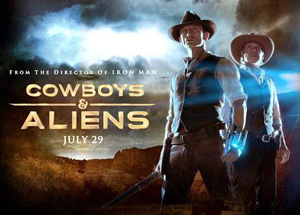 Americans have a hard time knowing how to respond to the sins of our colonial past. Except for a few extremists, most people know on a gut level that the extermination of the Native Americans was a bad thing. Not that most would ever verbalize it, or offer reparations, or ask for forgiveness, or admit to current neocolonial actions, or give up stereotyped assumptions -- they just know it was wrong and don't know how to respond. The Western American way doesn't allow the past to be mourned or apologies to be made. Instead we make alien invasion movies.
Americans have a hard time knowing how to respond to the sins of our colonial past. Except for a few extremists, most people know on a gut level that the extermination of the Native Americans was a bad thing. Not that most would ever verbalize it, or offer reparations, or ask for forgiveness, or admit to current neocolonial actions, or give up stereotyped assumptions -- they just know it was wrong and don't know how to respond. The Western American way doesn't allow the past to be mourned or apologies to be made. Instead we make alien invasion movies.
In the wake of the tragic bombing in Norway this past weekend, we are left with an unsettling picture of the state of anti-Islamic sentiments in the United States. There were broad attempts to blame the bombings on Islamic terrorism before all of the facts of the attack were out, and even after the attacker became known as Anders Behring Breivik, a self-proclaimed Christian extremist, the discussion focused on Breivik's statement that he was responding to the threat Muslims pose in Europe.
Shakespeare said a rose by any other name would smell as sweet. Maybe, but a Stink Rose by any other name (say... garlic?) might get more play.
On July 19, Campus Crusade for Christ announced its plan to officially change its name to Cru in early 2012.
Brown v. Board of Education had not yet been fought in the Supreme Court when Bill and Vonetta Bright christened their evangelical campus-based ministry Campus Crusade for Christ in 1951. The evangelical church context was overwhelmingly white, middle class, and suburban. The nation and the church had not yet been pressed to look its racist past and present in the face. The world had not yet been rocked by the international fall of colonialism, the rise of the Civil Rights movement, the disillusionment of the Vietnam War, the burnt bras of the women's liberation movement, the fall of the Berlin Wall, or the rise of the Black middle class (more African Americans now live in the suburbs than in inner cities). In short, theirs was not the world we live in today. So, the name Campus Crusade for Christ smelled sweet. Over the past 20 years, though, it has become a Stink Rose ... warding off many who might otherwise have come near.
The way you think and feel about the world is shaped by what you see when you get out of bed in the morning. I remember hearing this from civil rights activists. It simply means that perspective is hugely determined by place, context, and vantage point. This is profoundly true for me and most of the people I've ever met. You see the world from the place you live.
Part of the problem in the current budget impasse in Washington, D.C. is the perspectives of the politicians in the debate. Every morning they see and hear each other; the gladiator ring of national politics; the Washington media; their donors; their ideological base; and their latest poll ratings.
I was not one of the 1,500 who attended the inaugural Wild Goose Festival in Shakori Hills, North Carolina last month, but I did grow up going to Christian summer camp. What’s the connection, you ask, between a festival and summer camp? Summer camp -- like festivals and extended retreats -- is often deeply formative because it gives kids (and adult counselors, for that matter) a glimpse at a kingdom lifestyle.
